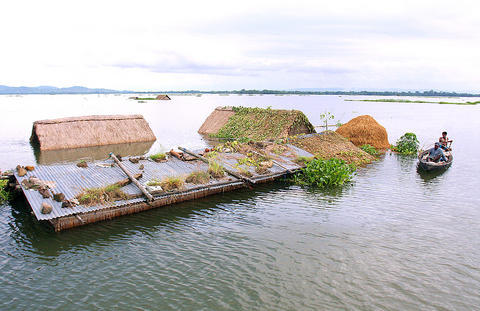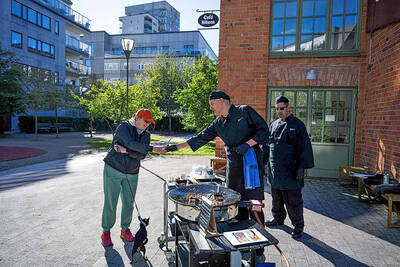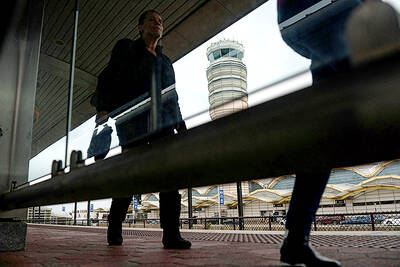Rescue operations were under way yesterday as the number of people stranded by floods from torrential monsoon rains and glacial snowmelt climbed to 12 million across north India, officials said.
Bihar, where flood waters have affected almost 7 million people, and Assam were among the worst affected states.
"A total of 6.89 million people are reeling under the effects of the floods," said Satish Chandra Jha, the top officials from Bihar's relief and rehabilitation department.

PHOTO: AP
More than 3,000 villages were waterlogged, the official added.
Nearly 1,000 people have died in India since the onset of monsoon rains in June, according to a tally compiled from officials and media reports.
Several rivers had burst their banks in the north of impoverished Bihar state while in other parts dams had been forced to discharge brimming water, the official added in the state capital Patna.
Charity Oxfam, which said it was working with local aid groups, expressed concern that a lack of clean drinking water could spark widespread waterborne illness.
"Providing safe drinking water and addressing public health is essential because it saves lives," Lalchand Garg, Oxfam's manager in eastern India, said in a statement.
At least 25 people have died due to the floods in Bihar in the past week, but the figure could rise.
Officials were also grappling to provide relief in northeastern Assam, where 5.5 million people have been displaced by floods.
"Relief and rescue workers are working on a war footing. But in this kind of a devastating flood, we know we cannot satisfy each and everybody," Assam chief minister Tarun Gogoi said.
Baby food and water purifying tablets were being dispatched, Gogoi said, but people stranded in Senimari village, just 75km east of Assam's main city, Guwahati, said they had yet to see either.
Flooding across north and northeast India claimed more than 150 lives in July.

READINESS: According to a survey of 2,000 people, 86 percent of Swedes believe the country is worth defending in the event of a military attack Swedes are stocking up on food items in case of war, as more conflict in Europe no longer feels like a distant possibility, and authorities encourage measures to boost readiness. At a civil preparedness fair in southwest Stockholm, 71-year-old Sirkka Petrykowska said that she is taking the prospect of hostilities seriously and preparing as much as she can. “I have bought a camping stove. I have taken a course on preservation in an old-fashioned way, where you can preserve vegetables, meat and fruit that lasts for 30 years without a refrigerator,” Petrykowska said. “I’ve set aside blankets for warmth, I

FRUSTRATIONS: One in seven youths in China and Indonesia are unemployed, and many in the region are stuck in low-productivity jobs, the World Bank said Young people across Asia are struggling to find good jobs, with many stuck in low-productivity work that the World Bank said could strain social stability as frustrations fuel a global wave of youth-led protests. The bank highlighted a persistent gap between younger and more experienced workers across several Asian economies in a regional economic update released yesterday, noting that one in seven young people in China and Indonesia are unemployed. The share of people now vulnerable to falling into poverty is now larger than the middle class in most countries, it said. “The employment rate is generally high, but the young struggle to

ENERGY SHIFT: A report by Ember suggests it is possible for the world to wean off polluting sources of power, such as coal and gas, even as demand for electricity surges Worldwide solar and wind power generation has outpaced electricity demand this year, and for the first time on record, renewable energies combined generated more power than coal, a new analysis said. Global solar generation grew by a record 31 percent in the first half of the year, while wind generation grew 7.7 percent, according to the report by the energy think tank Ember, which was released after midnight yesterday. Solar and wind generation combined grew by more than 400 terawatt hours, which was more than the increase in overall global demand during the same period, it said. The findings suggest it is

IN THE AIR: With no compromise on the budget in sight, more air traffic controllers are calling in sick, which has led to an estimated 13,000 flight delays, the FAA said Concerns over flight delays and missed paychecks due to the US government shutdown escalated on Wednesday, as senators rejected yet another bid to end the standoff. Democrats voted for a sixth time to block a Republican stopgap funding measure to reopen government departments, keeping much of the federal workforce home or working without pay. With the shutdown in its eighth day, lines at airports were expected to grow amid increased absenteeism among security and safety staff at some of the country’s busiest hubs. Air traffic controllers — seen as “essential” public servants — are kept at work during government shutdowns, but higher numbers